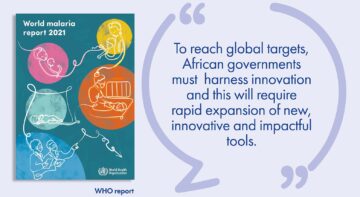Blogs

The WHO 2021 World Malaria Report indicates that African countries averted worst-case scenario, i.e. the doubling of malaria deaths in sub-Saharan Africa (SSA) as projected by WHO. Nonetheless, urgent action is needed to reach global malaria targets.
The report recommends a compilation of tools for tackling the disease stating that no single tool will solve the problem of malaria in SSA. To reach global targets, African governments must harness innovation, which will require rapid expansion of new, innovative and impactful tools.
In his Foreward in the report, Dr. Tedros Adhanom Ghebreyesus Director-General, WHO says that, “…we continue to need new tools to put an end to malaria and more investment in research and development. ….Malaria has afflicted humanity for millennia. We have the tools and strategy now to save many lives – and with new tools, to start to dream of a malaria-free-world.”
To speed the pace of progress against malaria and attain global targets, further investment is needed to accelerate research and development on new diagnostics, vector control approaches, antimalarial medicines and vaccines.
New tools and technologies for malaria control in Africa
In 2021, AFIDEP through the Platform for Dialogues and Action on Health Technologies in Africa (Health Tech Platform) undertook a Landscape and Political Economy Analysis of Emerging Health Technologies in Sub-Saharan Africa. The analysis found that various tools and technologies are under development and/or testing in different parts of the continent for Malaria control. These include: the malaria vaccine, gene drives for control and elimination of malaria, attractive toxic sugar baits, use of drones in larvae control, sterile male mosquitoes technology, and Ivermectin drug.
Malaria Vaccine
In October 2021, WHO recommended the first ever malaria vaccine, the RTS, S, also known as Mosquirix, for use in children living in regions with moderate to high malaria transmission. This vaccine, which has been piloted in Ghana, Kenya and Malawi, is seen as a major boost to the fight against Malaria.
Another promising vaccine highlighted by CDC is the whole sporozoite PfSPZ Vaccine. Trials in Western Kenya by CDC and KEMRI showed that the vaccine is safe and well-tolerated in infants and young children. CDC and KEMRI are also collaborating on a phase II evaluation of the vaccine in Kenya. Further evaluations to determine its efficacy are underway in different populations in Mali, Gabon, Tanzania, and Equatorial Guinea.
Gene drive for malaria control and elimination
Gene drive is a genetic phenomenon where genetic materials are transferred from parents to unusually high numbers of their offspring due to biased inheritance. The African Union in 2017 committed to invest in the development and regulation of gene drive technology. In 2018, the African Union Development Agency (AUDA-NEPAD) released a report that recommended various actions to operationalize the AU recommendation.
The Target Malaria consortium is evaluating a number of approaches to reduce the number of malaria mosquitoes using genetic modification, in particular gene drive technologies. The Consortium is currently undertaking preparatory work in Burkina Faso, Cape Verde, Ghana, Mali and Uganda needed to pave way for future testing of gene drives for malaria control in Africa.
Attractive Toxic Sugar Baits (ATSB)
Attractive-toxic sugar baits (ATSBs) are considered a new vector control tool that kills both female and male mosquitoes attracted to sugar feed on a sugary solution containing a mosquitocidal agentix. There are ongoing field trials in Kenya and Mali as well as studies to evaluate its efficacy.
Drones
In malaria control and elimination, drones are piloted for larval control by spraying over vast mosquito breeding sites like swamps. In addition to spraying larvicides, drones are also used to drop larvicide tablets, spread larvicide granules, and in low volume spray adulticides. In July 2021, Kenya’s President, HE Uhuru Kenyatta, who is also the Chair of the African Leaders Malaria Alliance (ALMA), flagged off the use of drones in the larvae control of mosquito habitats in Kenya.
Sterile Insect Technique
Researchers at the Wits Research Institute for Malaria are working on sterile male mosquitoes technology as a new tool that has the potential to add value to existing tools for malaria control and elimination in Africa. Sterile Insect Technique works almost like a birth control for mosquitoes and it relies on sterile male mosquitoes mating with virgin female mosquitoes. This tool is currently under investigation in South Africa
Ivermectin drug
Ivermectin drug is an anti-parasitic drug that acts by killing mosquitoes that are exposed to it while feeding on the blood of people (known as blood feeds) who have ingested the drug. This drug has been tested in Senegal, Liberia, Mali and Burkina Faso. Several studies are currently ongoing to determine the effect of this drug on reducing malaria.
Artificial Intelligence
Artificial Intelligence is the automation of activities associated with human thinking such as decision-making, problem-solving, and learning. For Malaria control and elimination, Zzapp Company leverages on AI to analyze satellite images and topographical maps to identify malaria transmission hotspots and optimizes malaria elimination strategies for each location. Its software system supports both the planning and implementation of malaria elimination operations by analyzing satellite images and topographical maps.
Zzapp has implemented and tested this technology in Tanzania with funding from the Gates Foundation, Ethiopia in collaboration with International Centre of Insect Physiology and Ecology (ICIPE), Ghana, and São Tomé and Príncipe.
Access WHO 2021 World Malaria Report HERE
Related Posts





